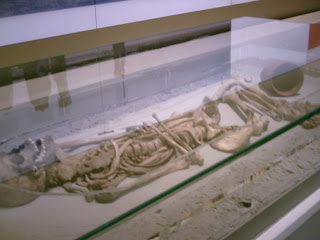
The Beaker culture reached Britain from across the English Channel and a had a major impact on life in pre-historic Britain: not only did the Beaker People bring the earliest metal objects of copper and gold, but they also brought a new burial rite to the isles. In contrast to the earlier Neolithic tribes who had buried their dead in communal graves under long barrows, the Beaker People had individual burials, usually under round barrows, which were built and re-used for 1000 years.
The Beaker culture got its name from the distinctly shaped clay pots these people placed next to their dead in addition to other grave goods such as copper daggers, gold trinkets, flint arrowheads, and archer's wristguards made of stone. These grave goods were either the possessions of the dead person and/or they might have been intended as provisions for (the journey into) the afterlife. Men were usually given more grave goods than women, and the objects that were buried with them typically indicated their warrior status. The beakers themselves likely contained some sort of alcoholic beverage.


Info courtesy of the British Museum; male Beaker person can be found in Room 51 of the upper floor at the museum.


No comments:
Post a Comment